
Untitled [Dhaka]: photo by Muhammad Imam Hasan, 7 October 2017
A so called Supreme Being who gives animals cancers that devour half their bodyweight before killing them shd fuck off out of the Conceptual Universe forthwith. Take a hike, and take your fantastic Improved bandwith with you, murderous Dumbo genius!
RIP Smokey Smokingham. Boss cat of the house pack during much of his tenure.
"'They suffer in silence,' she said."
She hauled him off on foot to the mercy seat. Drear familiar ritual duty!
RIP
Smokey Smokingham, beautiful feline friend, loving the life when he was
here, joined us 15 years ago departed the world of suffering this
morning mid sage and marigolds leaving what's left to the living (remains of the day), in this never-before season of the big smoke.
Smokey spirit now drifting in the wind, like ghost in Ugetsu.
Smokey spirit now drifting in the wind, like ghost in Ugetsu.
Puff puff (Ragamuffin) sniffed the abandoned fur husk w/mild suspicion. What's up? Where's the Boss?
Blackie knew nothing of any of it, won't notice the absence, won't care. (Where's Blackie got to anyway?)
Tear waterd S now enters the cobweb box jungle sanctuary rejoining former companions Prince Marcel, Little Prince, Dark Sister, Little Girl and Whitey.
Under mosquito star clouds. A crow and a stilt and a linnet.
While
S was going, watched a crow alight in street, pick at a bit of car
ejecta (freeway feeder rubbish), squirrel arrived, ignored by crow, oblivious, I thought
good omen live and let live, then second crow arrived angry squawking,
chased off nonplussed squirrel.
Backup? Support? Ganging up. No reason at all.
Backup? Support? Ganging up. No reason at all.
Life! Oh! So long! So strange! So soon over! Or maybe not soon enough?

Untitled [Chennai]: photo by Sasikumar Ramachandran, 16 September 2017

KAZUO MIYAGAWA POWER! [cinematographer of Kenji Mizoguchi's 1953 film] #Ugetsu: image via Kenji Fujishima, 3 May 2014

Vivian Maier Chicago, 1963: image via au charbon @alcharbon68, 1 July 2017
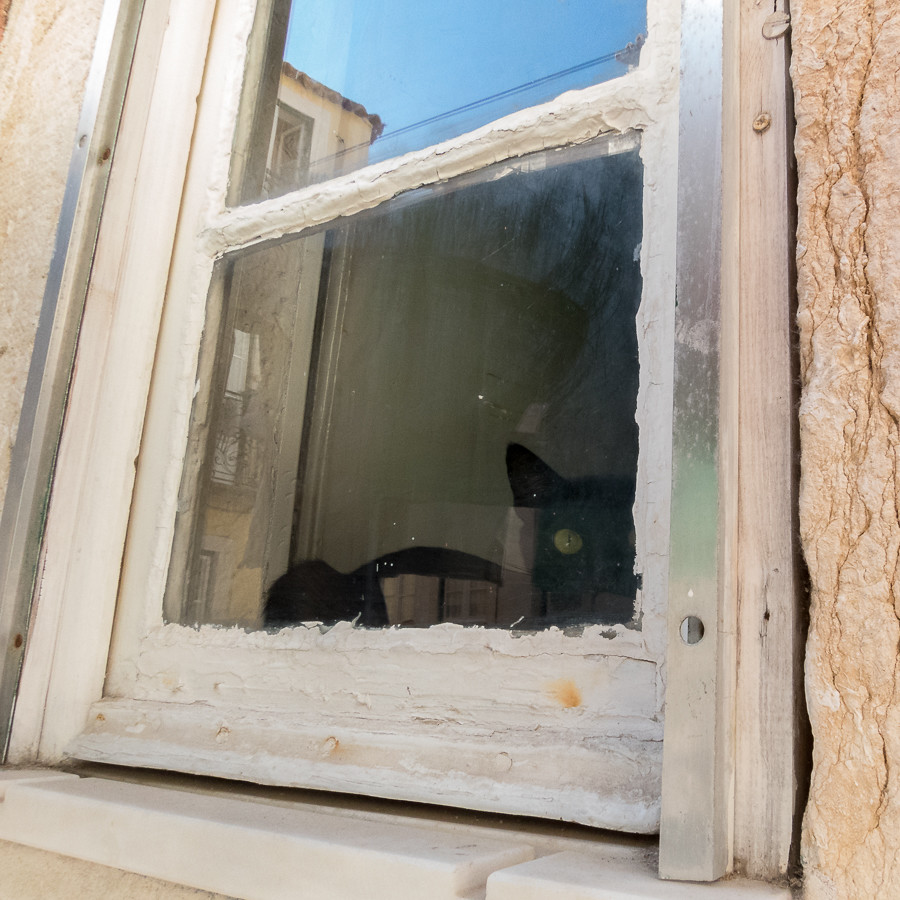
Alfana, Lisboa, Portugal: photo by El1saB, 2 September 2017
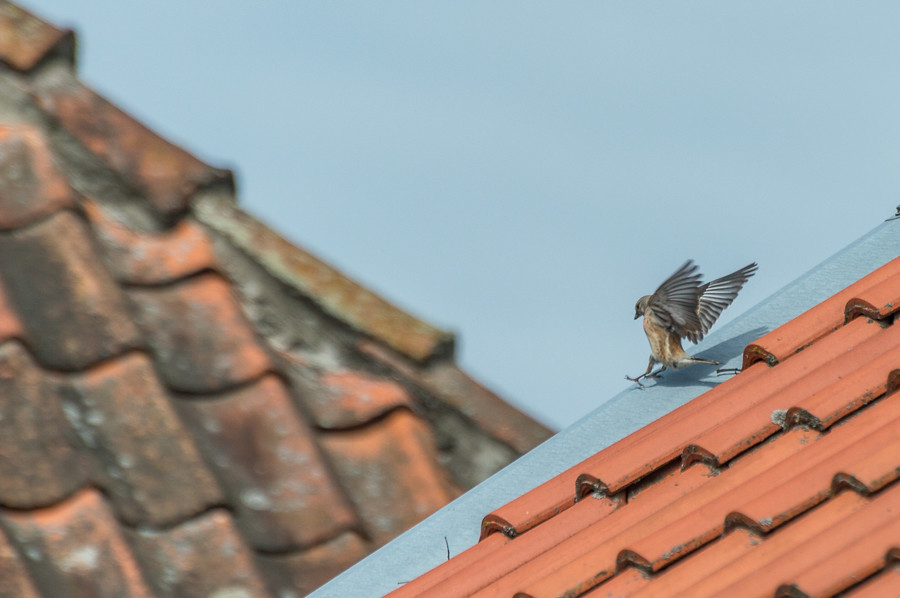
Pintarroxo | Carduelis cannabinal | Linnet. Tykocin, Poland: photo by El1saB, 1 June 2017

Biebrza National Park (near Lomza), Poland: photo by El1saB, 1 June 2017
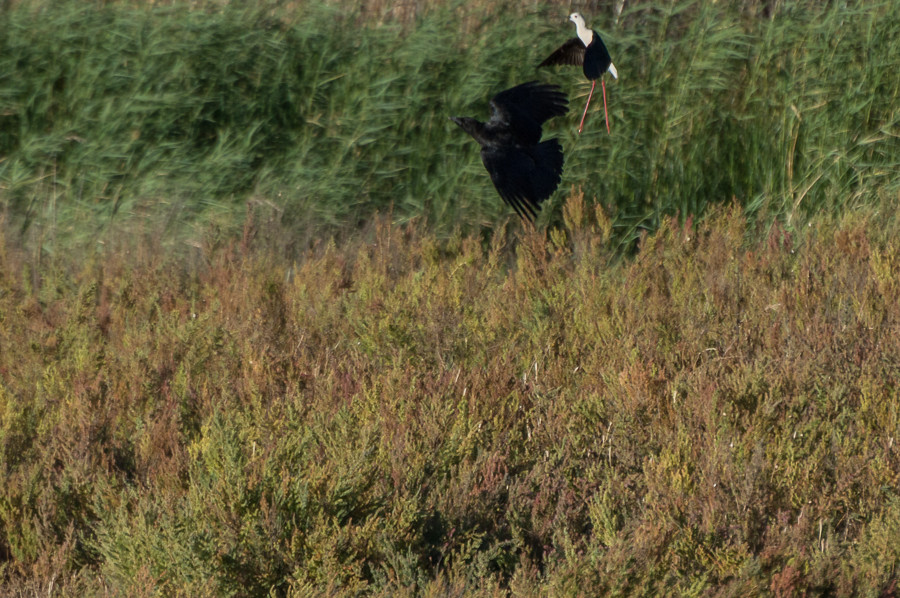
Pernilongo | Himantopus himantopus | Black-winged Stilt and Gralha-preta | Corvus corone | Carrion Crow. EVOA, Ponta da Erva, Vila Franca de Xira, Portugal: photo by El1saB, 30 June 2017
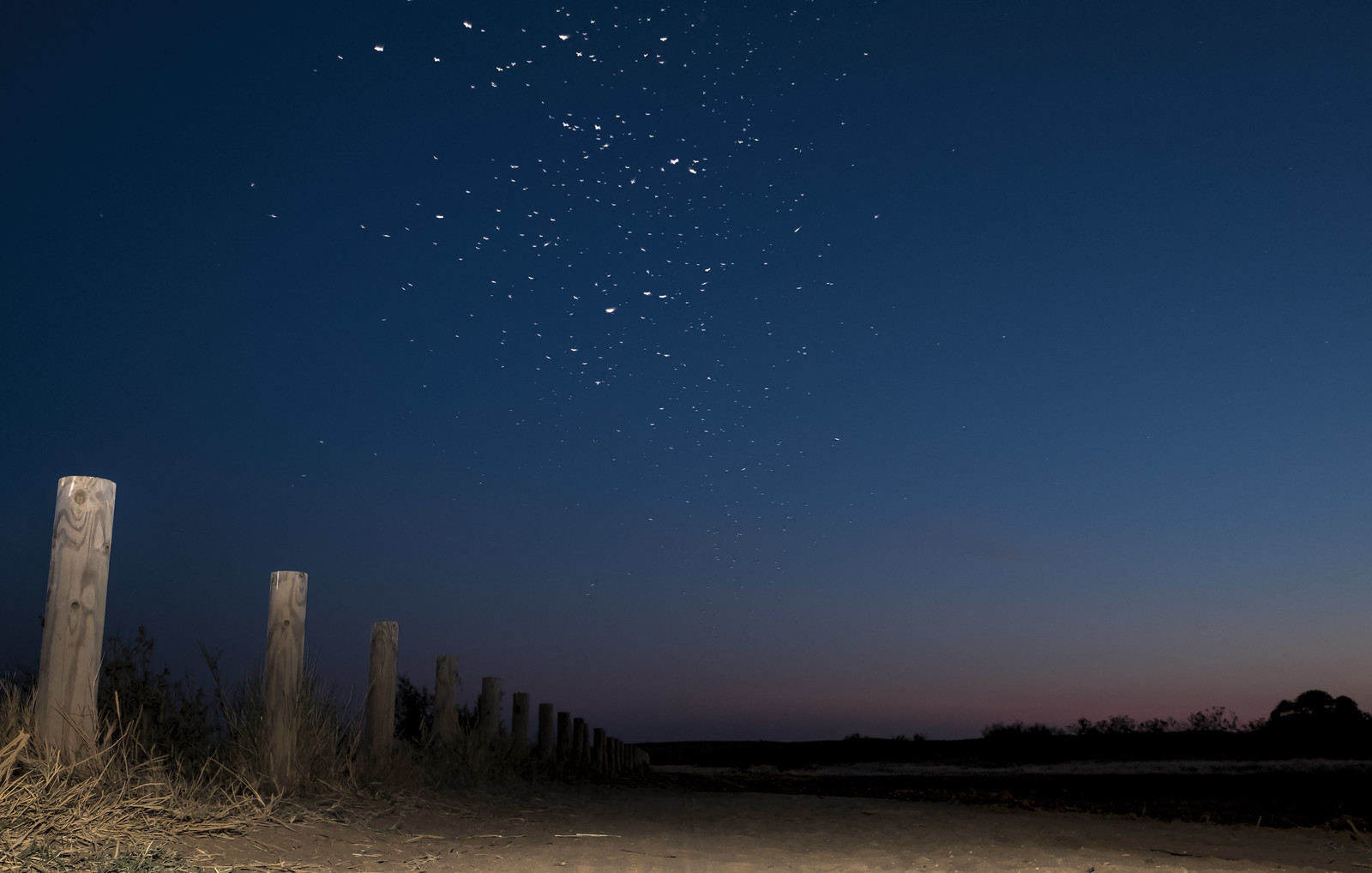
Untitled [Mosquitoes, Lagoa del Salgados, Algarve]: photo by Paulo Guerra, 24 September 2017

Untitled [Mosquitoes, Lagoa del Salgados, Algarve]: photo by Paulo Guerra, 24 September 2017

Untitled [Mosquitoes, Lagoa del Salgados, Algarve]: photo by Paulo Guerra, 24 September 2017

Fernando Pessoa: The falling of leaves that one senses before hearing them fall

Parque das Caldas da Rainha, Portugal. Landscape architecture by Francisco Caldeira Cabral (1908-1992): photo by Manuel Silveira Ramos, 2003 (Biblioteca de Arte / Art Library Fundaçao Calouste Gulbenkian)
The further we advance in life, the more we become convinced of two
contradictory truths. The first is that, confronted by the reality of
life, all the fictions of literature and art pale into insignificance…
They are just dreams from which one awakens, not memories or nostalgic
longings with which we might later live a second life.
The second is this: every noble soul wishes to live life to the full, to experience everything and every feeling, to know every corner of the earth and, given that this is impossible, life can only be lived to the full subjectively, only lived in its entirety once renounced.
The second is this: every noble soul wishes to live life to the full, to experience everything and every feeling, to know every corner of the earth and, given that this is impossible, life can only be lived to the full subjectively, only lived in its entirety once renounced.
These two truths are mutually irreducible…
Nothing satisfies me, nothing consoles me, everything -- whether or not it has ever existed -- satiates me. I neither want my soul nor wish to renounce it. I desire what I do not desire and renounce what I do not have. I can be neither nothing nor everything: I’m just the bridge between what I do not have and what I do not want.

Parque das Caldas da Rainha, Portugal. Landscape architecture by Francisco Caldeira Cabral (1908-1992): photo by Manuel Silveira Ramos, 2003 (Biblioteca de Arte / Art Library Fundaçao Calouste Gulbenkian)
To
cease, to be unknown and external, the stirring of branches in remote
avenues, the tenuous falling of leaves that one senses without hearing
them fall, the subtle sea of distant fountains, and the whole indistinct
world of gardens at night, lost in endless complexities, the natural
labyrinths of the dark!
To cease, to end once and for all, yet to survive in another form, as the page of a book, a loose lock of hair, a swaying creeper outside a half-open window, insignificant footsteps on the fine gravel curve of a path, the last twist of smoke high above a village as it falls asleep, the idle whip of the waggoner stopped by the road in the morning... Absurdity, confusion, extinction -- anything but life...
To cease, to end once and for all, yet to survive in another form, as the page of a book, a loose lock of hair, a swaying creeper outside a half-open window, insignificant footsteps on the fine gravel curve of a path, the last twist of smoke high above a village as it falls asleep, the idle whip of the waggoner stopped by the road in the morning... Absurdity, confusion, extinction -- anything but life...
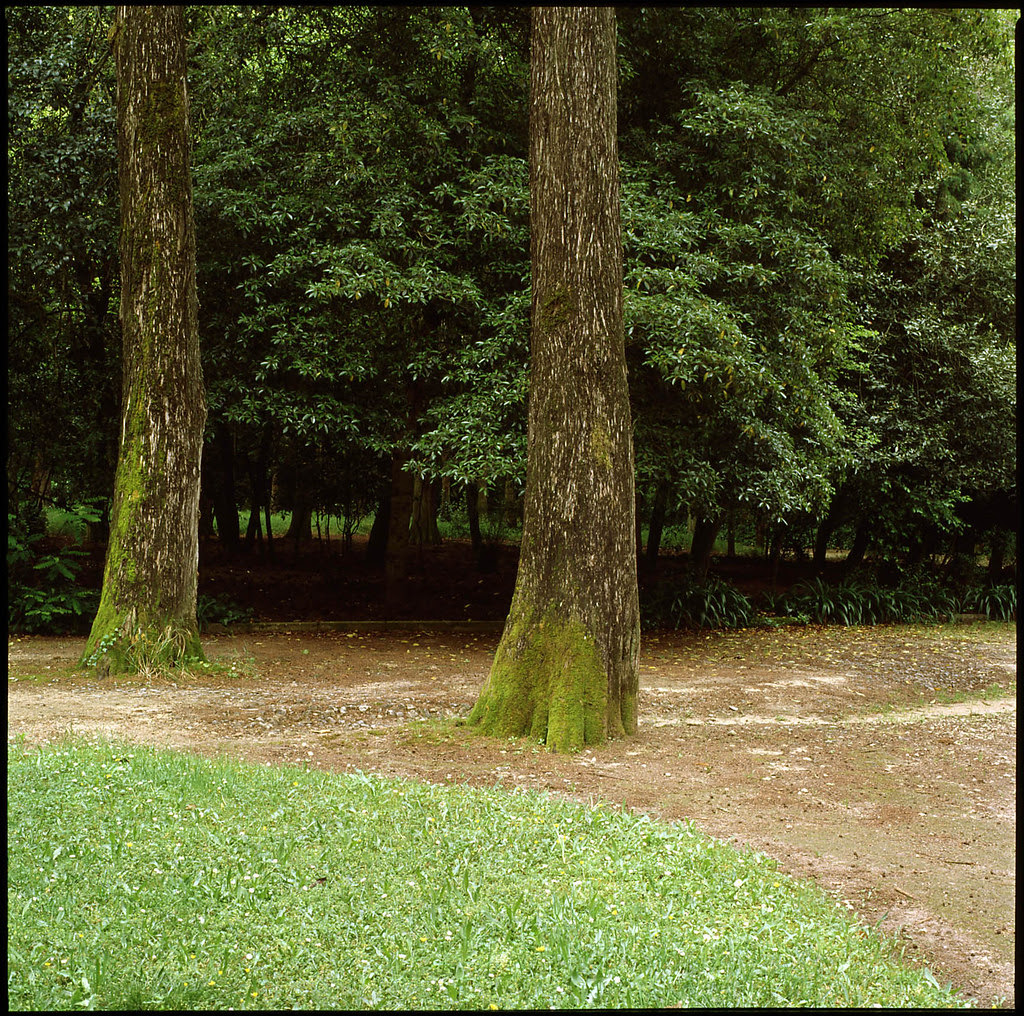
Parque das Caldas da Rainha, Portugal. Landscape architecture by Francisco Caldeira Cabral (1908-1992): photo by Manuel Silveira Ramos, 2003 (Biblioteca de Arte / Art Library Fundaçao Calouste Gulbenkian)
Every
day things happen in the world that can’t be explained by any law of
things we know. Every day they’re mentioned and forgotten, and the same
mystery that brought them takes them away, transforming their secret
into oblivion.
Such is the law by which things that can’t be explained must be forgotten. The visible world goes on as usual in the broad daylight. Otherness watches us from the shadows.

Knowing clearly that who we are has nothing to do with us, that what we
think or feel is always in translation, that perhaps what we want we
never wanted -- to know this every moment, to feel this in every feeling,
is not this what it means to be a stranger in one’s own soul, an exile
from one’s own feelings?

Parque das Caldas da Rainha, Portugal. Landscape architecture by Francisco Caldeira Cabral (1908-1992): photo by Manuel Silveira Ramos, 2003 (Biblioteca de Arte / Art Library Fundaçao Calouste Gulbenkian)
The
most painful feelings, the most piercing emotions are also the most
absurd ones -- the longing for impossible things precisely because they
are impossible, the nostalgia for what never was, the desire for what
might have been, one's bitterness that one is not someone else, or one's
dissatisfaction with the very existence of the world.
I don't know if these feelings are some slow madness brought on by hopelessness, if they are recollections of some other world in which we've lived -- confused, jumbled memories, like things glimpsed in dreams, absurd as we see them now but not in their origin if we but knew what that was. I don't know if we once were other beings, whose greater completeness we sense only incompletely today, being mere shadows of what they were, beings that have lost their solidity in our feeble two-dimensional imaginings of them amongst the shadows we inhabit.
The impossibility of imagining something they might correspond to, the impossibility of finding some substitute for what in visions they embrace, all this weighs on one like a judgement given one knows not where, by whom, or why.
I don't know if these feelings are some slow madness brought on by hopelessness, if they are recollections of some other world in which we've lived -- confused, jumbled memories, like things glimpsed in dreams, absurd as we see them now but not in their origin if we but knew what that was. I don't know if we once were other beings, whose greater completeness we sense only incompletely today, being mere shadows of what they were, beings that have lost their solidity in our feeble two-dimensional imaginings of them amongst the shadows we inhabit.
The impossibility of imagining something they might correspond to, the impossibility of finding some substitute for what in visions they embrace, all this weighs on one like a judgement given one knows not where, by whom, or why.

Parque das Caldas da Rainha, Portugal. Landscape architecture by Francisco Caldeira Cabral (1908-1992): photo by Manuel Silveira Ramos, 2003 (Biblioteca de Arte / Art Library Fundaçao Calouste Gulbenkian)
Everywhere I have been in my life,
in every situation, wherever I've lived and worked alongside people,
I've always been considered by everyone to be an intruder or, at the
least, a stranger. Amongst my relatives as amongst acquaintances, I've
always been considered an outsider. Not that even once have I been
treated like that consciously, but the spontaneous response of others to
me ensured that I was.
Everyone everywhere has always treated me kindly. Very few people, I think, have had so few raise their voice against them, or been so little frowned at, so infrequently the object of someone else's arrogance or irritability. But the kindness with which I was treated was always devoid of affection. For those who would naturally be closest to me, I was always a guest who, as such, was well treated but only with the attentiveness due to a stranger and the lack of affection which is the lot of the intruder.
I'm sure that all this, I mean other people's attitudes towards me, lies principally in some obscure intrinsic flaw in my own temperament. Perhaps I communicate a coldness that unwittingly obliges others to reflect back my own lack of feeling.
I get to know people quickly. It doesn't take long for people to grow to like me. But I never gain their affection. I've never experienced devotion. To be loved has always seemed to me an impossibility, as unlikely as a complete stranger suddenly addressing me as familiarly as 'tu' [Portuguese. Familiar second-person pronoun].
I don't know if this makes me suffer or if I simply accept it as my indifferent fate, and to which questions of suffering or acceptance do not enter.
I always wanted to please. It always hurt me that people should be indifferent towards me. As an orphan of Fortune I have, like all orphans, a need to be the object of someone's affection. I've always been starved of the realization of that need. I've grown so accustomed to this vain hunger that, at times, I'm not even sure I still feel the need to eat.
With or without it life still hurts me.
Others have someone who is devoted to them. I've never had anyone who even considered devoting themselves to me. That is for others: me, they just treat decently.
I recognize in myself the capacity to arouse respect but not affection. Unfortunately I've done nothing that in itself justifies that initial respect and so no one has ever managed fully to respect me either.
I sometimes think that I enjoy suffering. But the truth is I would prefer something else.
Fernando Pessoa (1888-1935): The falling of leaves that one sense before hearing them fall from The Book of Disquiet (O Livro do Desassossego), first published in Portuguese 1982, English translation by Margaret Jull Costa, 1991
Everyone everywhere has always treated me kindly. Very few people, I think, have had so few raise their voice against them, or been so little frowned at, so infrequently the object of someone else's arrogance or irritability. But the kindness with which I was treated was always devoid of affection. For those who would naturally be closest to me, I was always a guest who, as such, was well treated but only with the attentiveness due to a stranger and the lack of affection which is the lot of the intruder.
I'm sure that all this, I mean other people's attitudes towards me, lies principally in some obscure intrinsic flaw in my own temperament. Perhaps I communicate a coldness that unwittingly obliges others to reflect back my own lack of feeling.
I get to know people quickly. It doesn't take long for people to grow to like me. But I never gain their affection. I've never experienced devotion. To be loved has always seemed to me an impossibility, as unlikely as a complete stranger suddenly addressing me as familiarly as 'tu' [Portuguese. Familiar second-person pronoun].
I don't know if this makes me suffer or if I simply accept it as my indifferent fate, and to which questions of suffering or acceptance do not enter.
I always wanted to please. It always hurt me that people should be indifferent towards me. As an orphan of Fortune I have, like all orphans, a need to be the object of someone's affection. I've always been starved of the realization of that need. I've grown so accustomed to this vain hunger that, at times, I'm not even sure I still feel the need to eat.
With or without it life still hurts me.
Others have someone who is devoted to them. I've never had anyone who even considered devoting themselves to me. That is for others: me, they just treat decently.
I recognize in myself the capacity to arouse respect but not affection. Unfortunately I've done nothing that in itself justifies that initial respect and so no one has ever managed fully to respect me either.
I sometimes think that I enjoy suffering. But the truth is I would prefer something else.
Fernando Pessoa (1888-1935): The falling of leaves that one sense before hearing them fall from The Book of Disquiet (O Livro do Desassossego), first published in Portuguese 1982, English translation by Margaret Jull Costa, 1991

Parque das Caldas da Rainha, Portugal. Landscape architecture by Francisco Caldeira Cabral (1908-1992): photo by Manuel Silveira Ramos. 2003 (Biblioteca de Arte / Art Library Fundaçao Calouste Gulbenkian)
A Difference


Pittsburgh Pirates
center fielder Andrew McCutchen (22) and right fielder Gregory Polanco
(25) leap in celebration after the Pirates defeated the Baltimore
Orioles 5-3 in a baseball game, Wednesday, Sept. 27, 2017, in
Pittsburgh.: photo by Keith
Srakocic/AP, 26 September 2017

Pittsburgh Pirates
center fielder Andrew McCutchen (22) and right fielder Gregory Polanco
(25) leap in celebration after the Pirates defeated the Baltimore
Orioles 5-3 in a baseball game, Wednesday, Sept. 27, 2017, in
Pittsburgh.: photo by Keith
Srakocic/AP, 26 September 2017



Red Sox center fielder Mookie Betts ran
into the stands and was injured while chasing a fly ball at Fenway Park
on June 12.: photo by Barry Chin/Globe Staff, 12 June 2015

Bright sunlight made Red Sox second
baseman Dustin Pedroia lose a pop up fly ball hit by the Blue Jays’
Kevin Pillar at Fenway Park on June 14.: photo by Jim Davis/Globe Staff, 14 June 2015
Radio
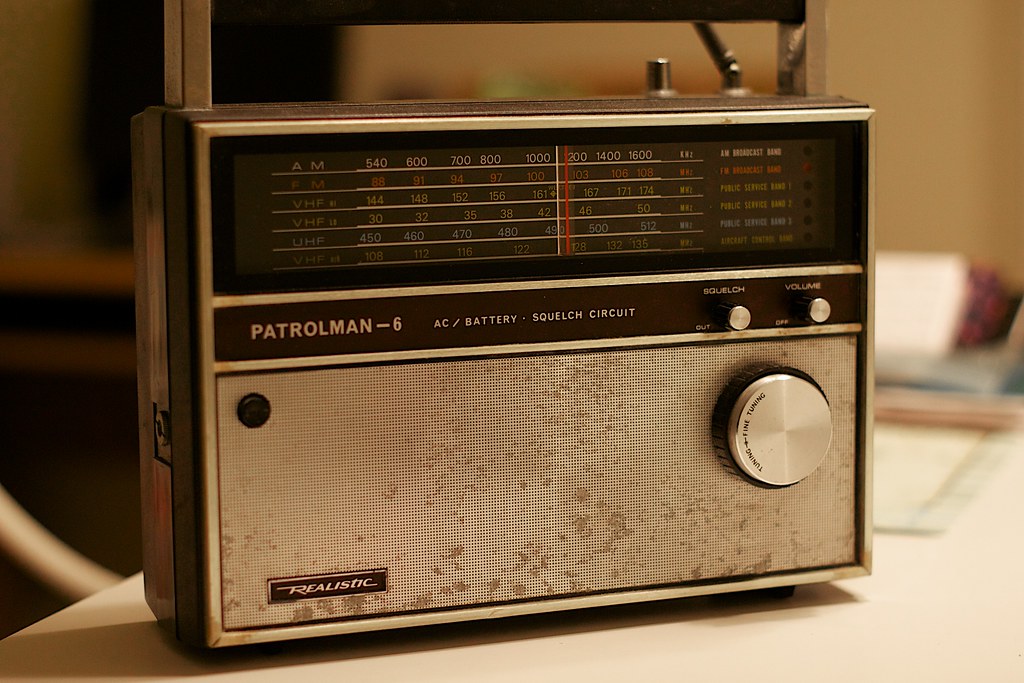
Dad's Radio. Found the old radio at Mom's house - this went to the beach on family vacations to Ocean City in the 1970s. My folks were believers in hanging on to stuff that still works.: photo by Alan Levine, 9 September 2011
Don't hurt the radio for
Against all
Solid testimony machines
Have feelings
Too
Brush past it lightly
With a fine regard
For allowing its molecules
To remain 100% intact
Machines can think like Wittgenstein
And the radio's a machine
Thinking softly to itself
Of the Midnight Flower
As her tawny parts unfold
In slow motion the boat
Rocks on the ocean
As her tawny parts unfold
The radio does something mental
To itself singingly
As her tawny parts unfold
Inside its wires
And steal away its heart
Two minutes after eleven
The color dream communicates itself
The ink falls on the paper as if magically
The scalp falls away
A pain is felt
Deep in the radio
I take out my larynx and put it on the blue chair
And do my dance for the radio
It's my dance in which I kneel in front of the radio
And while remaining motionless elsewise
Force my eyeballs to come as close together as possible
While uttering a horrible and foreign word
Which I cannot repeat to you without now removing my larynx
And placing it on the blue chair
The blue chair isn't here
So I can't do that trick at the present time
The radio is thinking a few licks of its own
Pianistic thoughts attuned to tomorrow's grammar
Beautiful spas of seltzery coition
Plucked notes like sandpaper attacked by Woody Woodpecker
The radio says Edwardian farmers from Minnesota march on the Mafia
Armed with millions of radioactive poker chips
The radio fears foul play
It turns impersonal
A piggy bank was smashed
A victim was found naked
Radio how can you tell me this
In such a chipper tone
Your structure of voices is a friend
The best kind
The kind one can turn on or off
Whenever one wants to
But that is wrong I know
For you will intensely to continue
And in a deeper way
You do
Hours go by
And I watch you
As you diligently apply
A series of audible frequencies
To tiny receptors
Located inside my cranium
Resulting in much pleasure for someone
Who looks like me
Although he is seated about two inches to my left
And the both of us
Are listening to your every word
With a weird misapprehension
It's the last of the tenth
And Harmon Killebrew is up
With a man aboard
He blasts a game winning home run
The 559th of his career
But no one cares
Because the broadcast is studio-monitored for taping
To be replayed in 212 years
Heaven must be like this, radio
To not care about anything
Because it's all being taped for replay much later
Heaven must be like this
For as her tawny parts unfold
The small lights swim roseate
As if of sepals were the tarp made
As it is invisibly unrolled
And sundown gasps its old Ray Charles 45 of "Georgia"
Only through your voice
Against all
Solid testimony machines
Have feelings
Too
Brush past it lightly
With a fine regard
For allowing its molecules
To remain 100% intact
Machines can think like Wittgenstein
And the radio's a machine
Thinking softly to itself
Of the Midnight Flower
As her tawny parts unfold
In slow motion the boat
Rocks on the ocean
As her tawny parts unfold
The radio does something mental
To itself singingly
As her tawny parts unfold
Inside its wires
And steal away its heart
Two minutes after eleven
The color dream communicates itself
The ink falls on the paper as if magically
The scalp falls away
A pain is felt
Deep in the radio
I take out my larynx and put it on the blue chair
And do my dance for the radio
It's my dance in which I kneel in front of the radio
And while remaining motionless elsewise
Force my eyeballs to come as close together as possible
While uttering a horrible and foreign word
Which I cannot repeat to you without now removing my larynx
And placing it on the blue chair
The blue chair isn't here
So I can't do that trick at the present time
The radio is thinking a few licks of its own
Pianistic thoughts attuned to tomorrow's grammar
Beautiful spas of seltzery coition
Plucked notes like sandpaper attacked by Woody Woodpecker
The radio says Edwardian farmers from Minnesota march on the Mafia
Armed with millions of radioactive poker chips
The radio fears foul play
It turns impersonal
A piggy bank was smashed
A victim was found naked
Radio how can you tell me this
In such a chipper tone
Your structure of voices is a friend
The best kind
The kind one can turn on or off
Whenever one wants to
But that is wrong I know
For you will intensely to continue
And in a deeper way
You do
Hours go by
And I watch you
As you diligently apply
A series of audible frequencies
To tiny receptors
Located inside my cranium
Resulting in much pleasure for someone
Who looks like me
Although he is seated about two inches to my left
And the both of us
Are listening to your every word
With a weird misapprehension
It's the last of the tenth
And Harmon Killebrew is up
With a man aboard
He blasts a game winning home run
The 559th of his career
But no one cares
Because the broadcast is studio-monitored for taping
To be replayed in 212 years
Heaven must be like this, radio
To not care about anything
Because it's all being taped for replay much later
Heaven must be like this
For as her tawny parts unfold
The small lights swim roseate
As if of sepals were the tarp made
As it is invisibly unrolled
And sundown gasps its old Ray Charles 45 of "Georgia"
Only through your voice

foto do rádio capelinha da semp. Um PT-76 ou "capelinha" de 1970.: photo by Amatnecks, 26 December 2009
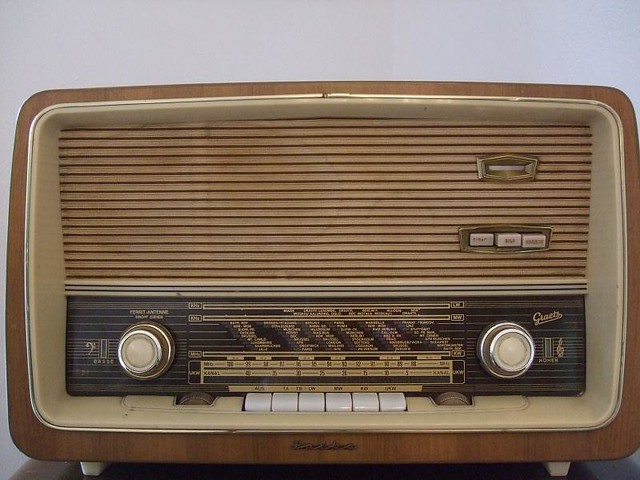
Radio: photo by playability_de, 4 June 2009
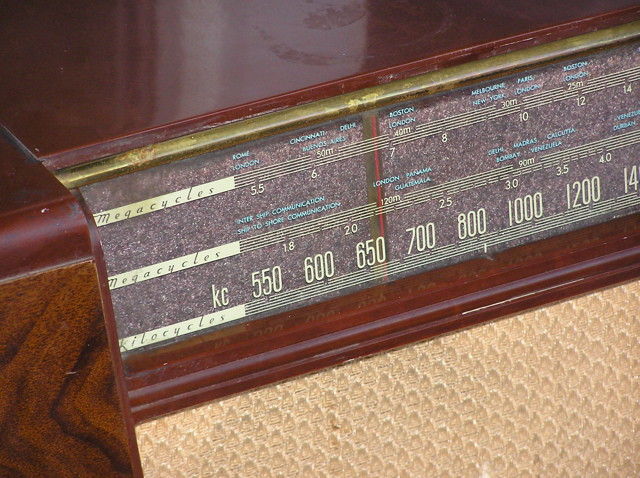
the PVR. PC180468.JPG.: photo by Duncan Rawlinson, 19 December 2004

Radio Blaupunkt. Old radio.: photo by peetje2, 6 February 2013

Radio Blaupunkt. Old radio.: photo by peetje2, 6 February 2013
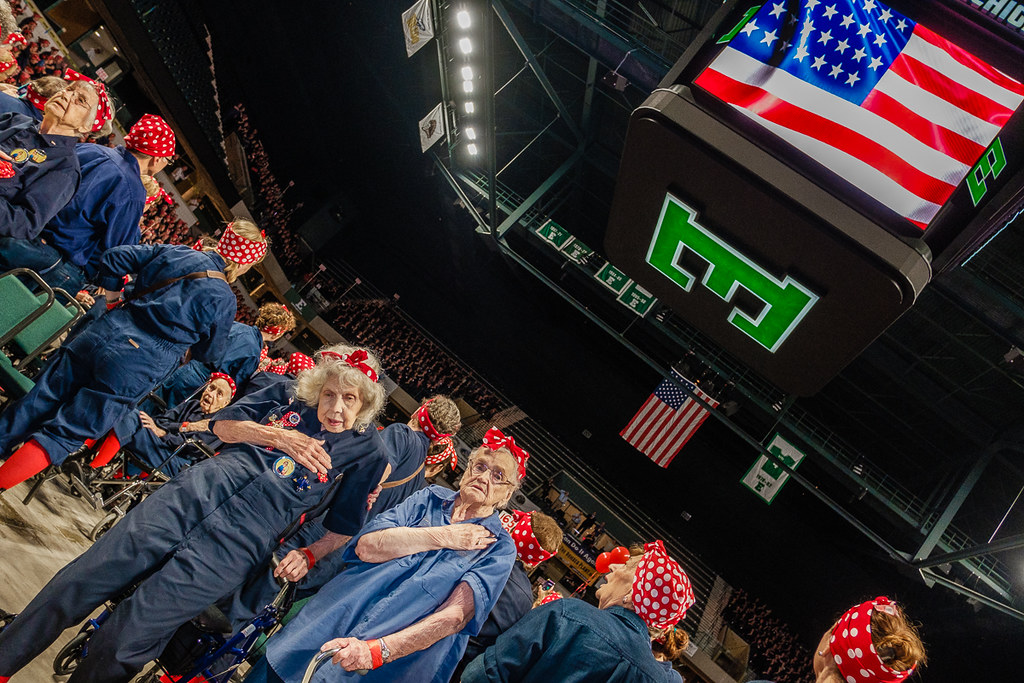
Ray Charles: Georgia On My Mind (live, Dick Cavett Show, 18 September 1972)
ReplyDeleteBy Boat in the Moonlight (clip from Mizoguchi: Ugetsu Monogatari)
On your game today, TC. Must be because it's my b'day@65. So far you're my best gift this year. You may also be #2 as I asked the kids for a copy of Poetry Wars. May I say of all the kitties headed to heaven, you are the koolest of kats. Gotta run, bake the bagels...k
ReplyDeleteVast congrats Kent, that was exactly the occasion!
ReplyDelete65 is not such a bad year I think, though can't remember.
Yesterday seemed about 65 years packed into 24 for us sad old geezers, as it was another of our too busy death duty days, longtime animal friend in box toted off down busy americano street, honk honk, on way to die.
But I shd speak for myself when I say old.
No longer able to stand the pace, even the pace of the shadows lengthening across the infield as the game advances, and no longer able even to see the game, as our jerry-rigged one-channel no-cable, no nothin 1947 Hallicrafters TV (7" round screen) only picks up the signal of some station in a country presided over by a blundering blustering dictator who makes Benito Mussolini look brilliant in comparison, and fortunately for me I'm now too blind to see even that.
The makers of bagels are a necessity of Earth, unlike wars, real estate, stock market and the rest. A blundering blustering fool with one thumb can blurt tweeps into the universe before it's even awake, but by that hour a bagel maker has already done his work, work essential to he ongoing of what's left of the yoomin rays, I always say.
Next year all Tigers all the time everywhere in the jungle, I can feel it in the bones already. Unless those are your bones I'm feeling it in. And that would be A-OK. Anybody who makes bagels, gotta have the good bones. No worm ever made a bagel.
Radio poem is terrific
ReplyDeleteKen't thank you enough.
ReplyDeleteHilton,
ReplyDeleteThose were the days.